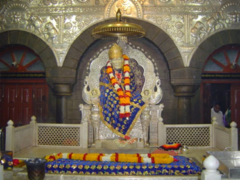By: Sri Radhakrishna Swamiji
 Sai Baba’s way of life speaks of the precious ties of inclusivity and ‘belonging’ that emerge from a deep and almost instinctive human need. Yet, it is this very need to belong to something we consider ‘our own’ that creates the category of non-belonging or ‘the other’.
Sai Baba’s way of life speaks of the precious ties of inclusivity and ‘belonging’ that emerge from a deep and almost instinctive human need. Yet, it is this very need to belong to something we consider ‘our own’ that creates the category of non-belonging or ‘the other’.
The idea of ‘otherness’ is central to how identities everywhere are constructed. In general, our social identities reflect the way we internalize the already established and sanctioned social categories within our societies, such as cultural, ethnic, national, class, caste, gender and other categories.
These categories shape our ideas about who we think we are, how we want to be seen by others, and the ‘rightness’ of groups to which we belong. They also shape how we see, judge, treat and respond to those who do not.
Sri Narasimha Swamiji in his masterpiece ‘The Life of Sai Baba’ has suggested that all identities are set up by us as dichotomies: woman being the other of man, animal the other of human, foreigner the other of national, illness the other of health, insanity the other of reason, layman the other of specialist, stranger the other of friend.
The otherness of the other becomes most rigid or dramatic when we have deep ties – to family, religion, nation, caste or ethnic group. Thus, any clear understanding of the other has built-in obstructions.
When we hear statements like “If you are not with us, you are against us”, or when we come across those who narrowly define for others just who a patriot or a nationalist is and if we do not agree, we might cringe or get angry or get vocal, even violent about our objections.
Yet we need to own up to the fact that we all stand somewhere on that spectrum of belonging versus otherness.
We need to acknowledge that acceptance of otherness first requires honestly acknowledging one’s consciousness or submerged biases about those who do not belong to our self-owned categories. It is too easy to see prejudice in others, but not in ourselves! It then requires ongoing awareness, insight, analysis, compassion and work. It requires avoiding assuming what any rabid smaller group believes and does is the norm for the entire population of the other. It requires, most importantly, being bigger than reacting to the goading of divisive voices from among our own.
Sai Satcharitra emphatically declares the truth that you are ‘paripurna’ or totally fulfilled, completely satisfied. For some reason you do not know it. Ignorance of your fullness causes an imaginary void.
Sai Baba accepts you as his own and gives knowledge of your fullness. Once you experience fullness, you will be independent of the world. Sai Baba also prescribes the technique of obtaining the world so that you are comfortable at any stage in life. In short, devotion to Sai Baba enables you to gain the world and not be bound to it.
Sai Baba’s grace having created and supported the notion of our own and the other, also has taught us to overcome the unhelpful side of this tendency. So how is it that we, as Sai devotees, end up doing absolutely the opposite? If such approaches and attitudes pain us or make us unhappy, how very important it is to re-commit to learning our lesson in ‘total surrender’ to Sai Baba and doing our best to live at his will! He removes the ignorance that conceals Him within yourself. Lust, anger, pride, jealousy, attachment and delusion form the basis of ignorance. Removal of these six passions enables us to experience ‘Self’ within ourselves and within everyone else. It leads us to experience that blissful oneness with all – ‘Aham Brahmasmi’
Here is an instance from the life of my Guru, Sri Narasimha Swamiji. He was staying in Siddharuda Ashram in Hubballi of Karnataka in 1929. Siddharuda Swamiji asked his pupils how they could tell when the night had ended and the day had begun. “Could it be”, asked one of the inmates, “when you can see an animal in the distance and tell whether it is a sheep or a dog?” “No” answered Siddharuda Swamijii. “Is it when you can look at a tree in the distance and tell whether it is a banyan tree or bilva tree?” Again, Siddharuda Swamiji answered “No”. The impatient pupils were looking forward to what reply Sri Narasimha Swamiji would give.
Sri Narasimha Swamiji gave an epoh-making reply: “It is when you can look on the face of any man or woman and see that it is your sister or brother. Because if you cannot see this, it is still night.”

Leave a Reply